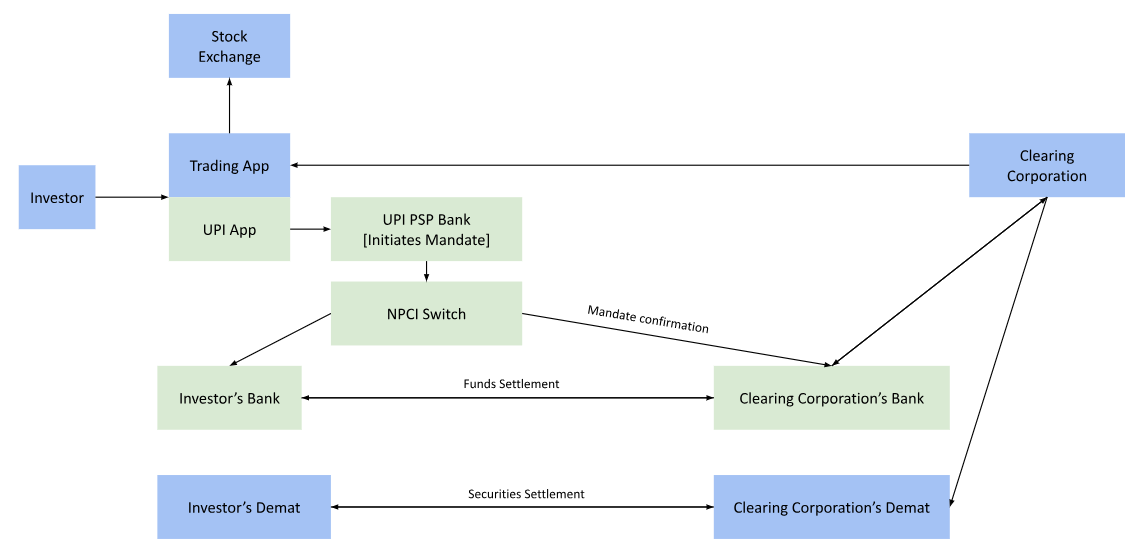January 3, 2024
Trading stocks with the new amount block framework
Guest Author | Equity Investing
SEBI has introduced the amount block framework for investing in the secondary markets starting January 1, 2024. This system functions similarly to blocking funds for an IPO application, where your funds are deducted only if you are bound to receive the shares.
How can an investor block an amount to fund their trades?
Investors can initiate a request to block funds in their bank account through the trading app they use. Once the request is placed on the trading app, the investor has to accept the UPI mandate confirming the block. Banks then relay this confirmation to the clearing corporation, which, in turn, confirms to the stockbroker that the investor can trade.
Here is a diagram to visualize the transaction flow:

Interest on the blocked amount
While the funds remain in the investor’s account, the block ensures that the money cannot be used for any other purpose. The funds are directly deducted from the investor’s bank account by the clearing corporation of the stock exchange when one invests. The blocked funds also earn interest in the savings account, just like funds blocked for IPOs.
However, there is no interest benefit if one invests the entire block amount on the same day since funds are debited by 8 pm. The bank pays interest if the funds stay in your account overnight.
Investors can set a preference.
Once the framework is live for the public, investors can choose between the
-
- Present pooling method – This is the existing flow where stockbrokers collect and send funds to the clearing corporation.
- Amount block method – This is the new framework where investors place a block and are subsequently debited by the clearing corporation.
Investors can switch between the two methods by placing a request with their stockbroker, but they cannot use both methods simultaneously.
Why is the framework not yet live for the public?
Although the UPI block framework has been launched, stockbrokers need to implement the required system changes, as this deviates from the current funds module. A period of development, along with testing the systems with a closed user group, will precede the public launch.
At present, this appears to be a couple of months away.
This guest post is by Mohit Mehra. Mohit splits his time between Zerodha & Rainmatter, sharing his experiences on this blog.


I understand that zerodha has not yet implemented block method. However, I would like to know if block method would also be supporting intraday trading?
EQ delivery is not free. The aboce statement by Karthik Rangappa is false and misleading. EQ delivery brokerage is as follows for using trading block functionality. This brokerage is because now zerodha will not get free money to use which are lying idle in client accounts.
Trading using 3-in-1 account with block functionality
Delivery & MTF Brokerage: 0.5% per executed order.
Intraday Brokerage: 0.05% per executed order.
No, its not if you use amount blocking facility.
Please scroll down to the very bottom of the charges explained page and read…
\”Trading using 3-in-1 account with block functionality
Delivery & MTF Brokerage: 0.5% per executed order.
Intraday Brokerage: 0.05% per executed order.\”
Its live now. But Zerodha have steeply increased the brokerage for client that want to trade by using \”block amount facility\”.
Even for delivery trades the btokerage has been increased to 0.5% from present 0 charge.
Sorry, EQ delivery is free. You can check all charges here – https://zerodha.com/charges#tab-equities
UPI For secondary market on block framework is mandatory from 1st February 2025,then why zerodha is not giving to its clients?
Brokers can either offer UPI block facility or 3-in-1 block facility from 1st Feb. Although we are working on UPI, we are already live with the 3-in-1 facility with IDFC bank.
Check this – https://support.zerodha.com/category/account-opening/online-account-opening/other-online-account-opening-related-queries/articles/idfc-3-in-1-with-blocking-facility
Does Zerodha offer block trades. If so what\’s the criteria to participate.
Nope, Zerodha does not offer this.
Is zerodha going to lose out on interest income if they implement it. Why would zerodha implement it and cut their free revenue?
Yes, not just Zerodha but holds true for the industry.
When will Zerodha allow it\’s clients to trade with the new amount block framework?
Not sure if I can comment on this, will keep you posted as and when this happens.